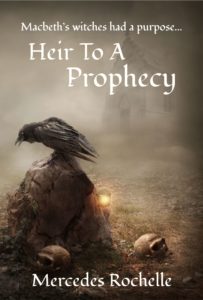 Get out of the way, Philippa Gregory! There’s a new sheriff in town.
Get out of the way, Philippa Gregory! There’s a new sheriff in town.
Or, considering the historical setting, should I say “high sheriff.”
Maybe “steward” (an important official who manages another’s property or financial affairs) might be even more accurate, because Mercedes Rochelle has entered the popular and competitive historical fiction field with Heir to a Prophecy. This tale follows a family from a penniless young man exiled from the court of Macbeth, the Scottish king made famous by Shakespeare, to becoming the first steward of Scotland. The story takes place during the early mid-11th century in Anglo-Saxon England, Wales, and Scotland. Rochelle tells the story in her own unique way that transcends genres and comfortable conventions, combining hints of the supernatural, hard-edged geopolitics, and historical characters presented as believable human beings living in that place and time. She uses well-researched details to depict scenes of home and hearth as well as cataclysmic battles.
The story starts with an excerpt from a scene in Macbeth, probably familiar to most of us, though it might be considered a throw-away scene. This is early in Shakespeare’s play, when Banquo and his son, Fleance, are leaving a banquet given by the ambitious Macbeth, and are attacked in a base betrayal.
Here is the excerpt from the original:
BANQUO: It will be rain tonight.
FIRST MURDERER: Let it come down.
The MURDERERS attack BANQUO
BANQUO: O treachery! Fly, good Fleance, fly, fly, fly!
Here is Rochelle’s spin:
It was a quiet night, punctuated by the crunch of stones underfoot. Not a cricket was heard – nor birds – only the sigh of leaves rustling far overhead.
“It shall be rain tonight,” Banquo said.
From behind came the cry: “Let it come down!”
In an instant, three dark forms were among them. Banquo was their main target, and two of them fell upon him, slashing the startled man in the face. The worthy lord was blinded by his own blood even as he shouted, “Villains, Murderers! Fly, Fleance, Fly!”
Fleance escapes, but where Shakespeare drops the father and son from his story, Rochelle traces the family through Fleance, his illegitimate son, Walter, and ultimately Walter becoming the first Steward of Scotland.
And the witches? What would any story with any connection to Macbeth be without the witches that Shakespeare included in his play? Some of us would have been tempted to turn the story over to the supernatural elements, which at that time and place were as real as the rocks or sky. The author, however, took a different approach. She incorporates the occult, allowing the witches to be seen and heard, but more as a whisper than a shout. They prophesize about Banquo’s lineage, but to what end? (Hint: Take a close look at the title.)
Making these fantastic elements easier to believe is that they are slipped in as easily as political intrigues, military strategies, and vivid, concrete, descriptions, such as at the Battle of Dunsinane:
Seward saw the danger and retreated, finding himself among friends, who had come to his aid. Together, four of them attacked the horseman, who reared up his mount, using the sharpened horseshoes to ward them off. He didn’t see the fifth man leap up from behind and throw crushing arms around his waist. The Norman was pulled from his horse slashing wildly with his sword. His random stroke met with flesh, but he didn’t know how successful he was; a blow to his face finished him off before he hit the ground…
Heir is the Rochelle’s first published book in a planned series exploring the late Anglo-Saxon period. Rochelle has a rich vein to explore, and she seems to a good candidate to become not sheriff, but steward, of these riches.
_____________________
Follow Frank’s blog at Frank Watson, Writer